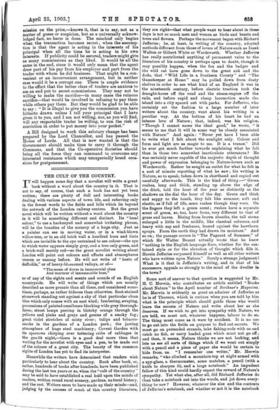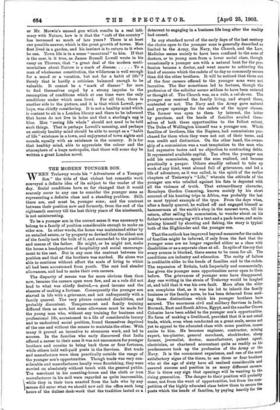THE CULT OF THE COUNTRY.
IT will happen some day that a novelist will write a great book without a word about the country in it. That is not to say, of course, that such a book has not yet been written; there are plenty of dull and interesting books dealing with various aspects of town life, and referring only in the fewest words to the fields and hills which lie beyond the network of the London railway centres. But the great novel which will be written without a word about the country in it will be something different and distinct. Its " local colour," to use a hackneyed and somewhat irritating phrase, will be the beauties of the scenery of a huge city. Just as a painter can see in moving water, or in a wind-blown willow-tree, or in an old brick wall a hundred hues and tints which are invisible to the eye untrained to see colour—the eye to which water appears simply grey, and a tree only green, and a brick-wall merely red—so the great novelist writing about London will point out colours and effects and atmospheres unseen or unsung before. He will not write of " hosts of daffodils," or of heavy-blossomed valleys, or of— "The moan of doves in immemorial elms
And murmur of innumerable bees,"
or of any of the sights and scents and sounds of an English countryside. He will write of things which are usually described as more prosaic than all these, and considered some- times, perhaps, as rather hideous than otherwise. Soot-stained stonework standing out against a sky of that particular clean blue which only comes with an east wind; lumbering, swaying, processions of painted omnibuses blocking wide grey thorough- fares ; street lamps peering in blotchy orange through the yellows and pinks and greys and greens of a smoky fog ; great violet stretches of misty river ; tulips and tobacco- smoke in the gardens of a London park ; the jarring atmosphere of huge steel machinery ; Covent Garden with its sparrows chirping over tottering cribs of cabbages in the gas-lit night,—there is a good deal more than that waiting for the novelist with eyes and a pen, to be made out of the colours of a great city. The beauty of the common sights of London has yet to find its interpreter.
Meanwhile the writers have determined that readers wish particularly to hear about the country. Book after book, or, rather, hundreds of books after hundreds, have been published during the last ten years or so, when the "cult of the country" may be said to have established a real hold upon the minds of readers, written round rural scenery, gardens, natural history, and the rest. Writers seem to have made up their minds—and, judging by the success of much of this country literature,
they are right—that what people want to hear about in thew) days is not so much men and women as birds and beasts and trees and flowers. Perhaps the movement began with Richard Jefferies ; he, at least, in writing of the country, adopted methods different from those of lovers of Nature such as Izaak Walton or Gilbert White or Wordsworth. Whether Jefferies has really contributed anything of permanent value to the literature of his country is perhaps open to doubt, though it may possibly happen, when the fox and the badger and the wild cat have gone down to the great auk and the dodo, that " Wild Life in a Southern County " and " The Gamekeeper at Home" may be pulled down from dusty shelves in order to see what kind of an England it was in the nineteenth century, before electric traction took the draught-horse off the road and the steam-engine off the rails, and before rapid and cheap locomotion made the island into a city spaced out with parks. For Jefferies, who certainly set the fashion to a large number of later writers about the country, went about his writing in a peculiar way. At the bottom of his heart he had an intense love of Nature ; that, indeed, was his religion. " Though I cannot name the ideal good," he wrote, " it seems to me that it will in some way be closely associated with Nature." And again : "Never yet have I been able to write what I felt about the sunlight only. Colour and form and light are as magic to me. It is a trance." Did he ever get much further towards explaining what he felt than in those two somewhat inarticulate utterances ? He was certainly never capable of the majestic depth of thought and power of expression belonging to Nature-lovers such as Wordsworth. Rather he sought an outlet for what he felt in a sort of minute reporting of what he saw ; his writing is Nature, so to speak, taken down in shorthand and copied out carefully afterwards. This is the kind of thing :—" Green rushes, long and thick, standing up above the edge of the ditch, told the hour of the year as distinctly as the shadows on the dial the hour of the day. Green and thick and sappy to the touch, they felt like summer, soft and elastic, as if full of life, mere rushes though they were. On the fingers they left a green scent ; rushes have a separate scent of green, so, too, have ferns, very different to that of grass and leaves. Rising from brown sheaths, the tall stems enlarged a little in the middle, like classical columns, and heavy with sap and freshness, leaned against the hawthorn sprays. From the earth they had drawn its moisture." And so on ; the passage occurs in " The Pageant of Summer," of which Sir Walter Besant actually wrote that he knew " nothing in the English language finer, whether for the sus- tained style or for the elevation of thought which fills it. Herein Jefferies surpassed himself as well as all other writers who have written upon Nature." Surely a strange judgment I What is it that in Jefferies's writing, and in that of his successors, appeals so strongly to the mind of the dweller in the town ?
Some sort of answer to that question is suggested by Mr. H. C. Merwin, who contributes an article entitled " Books about Nature " to the April number of Scribner's Magazine. Mr. Merwin is evidently as great an admirer of Jefferies as he is of Thoreau, which is curious when you are told by him what is the principle which should guide those who would learn the secrets of Nature and write about her as she deserves. If we wish to get into sympathy with Nature, we are told, we must not, whatever happens, labour to do so. The thing must come as it were by accident. It is no use to go out into the fields on purpose to find out secrets. We must go on pretended errands, take fishing-rods with us and catch no fish, or carry loaded guns which must not go off ; and then, it seems, Nature thinks we are not looking, and lets us see all sorts of things which if we went out simply with a pencil and a piece of paper she would be certain to hide from, us. " I remember one writer," Mr. Merwin remarks, "who climbed a mountain-top at night armed with a spy-glass, a thermometer, some matches, a pencil (with a knife to sharpen it), and a large notebook." An impudent fellow of this kind could hardly expect the reward of Nature's sympathy. Yet what else, after all, did Richard Jefferies do than take a notebook out into the woods, and jot down every- thing he saw ? However, whatever the size and the contents of Jefferies's notebook, and whether or not it is the notebook
or Mr. Merwin's unused gun which results in a real inti- macy with Nature, how is it that the " cult of the country " has increased so much of late years P There is at least one possible answer, which is the great growth of towns Man first lived in a garden, and his instinct is to return to it when he can. Town life is in a sense " unnatural " to him. If that is the case, is it true, as James Russell Lowell wrote in his essay on Thoreau, that "a great deal of the modern senti- mentalism about Nature is a mark of disease To a man of wholesome constitution, the wilderness is well enough for a mood or a vacation, but not for a habit of life"? Surely that is hardly a criticism balanced enough to be valuable. It cannot be a " mark of disease " for men to find themselves urged by a strong impulse to the resumption of conditions which at one time were the only conditions under which men lived. For all that, there is another side to the picture, and it is that which Lowell, per- haps, was chiefly considering. It is not a healthy mind which is content to sit in a London library and there to be informed that hares do not live in holes and that a starling's egg is blue. Men "seeing life whole" should not need to be told such things. That is perhaps Lowell's meaning, and perhaps an entirely healthy mind should be able to accept as a "habit of life " existence in a town, and enjoyment of town sights and sounds, equally with an existence in the country. It is for that healthy mind, able to appreciate the colour and the atmosphere of a huge metropolis, that there will some day be written a great London novel.



























































 Previous page
Previous page